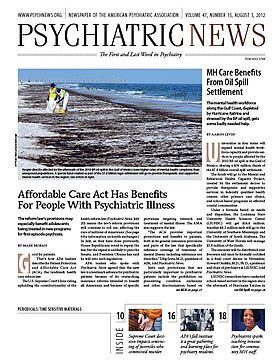For many decades addiction treatment has been driven primarily by behavioral strategies. A few medications are available to treat alcohol and opioid addictions and help smoking cessation, but no medication is approved by the Food and Drug Administration for addiction to stimulants, marijuana, hallucinogens, or other substances. In recent years, however, scientists have been moving closer to expanding the pharmacological armamentarium for addiction treatment.
“We have seen a sea change in the field of addiction, which is increasingly recognized as a brain disorder,” David Shurtleff, M.D., acting deputy director of the National Institute on Drug Abuse (NIDA), told Psychiatric News. As scientists understand more about the neurobiological mechanisms of addiction and discover molecular targets, “we are having some great opportunities in the area,” he noted.
Vaccines have been one of most promising addiction treatments in clinical research in the past few years. For smoking cessation, the theory is that if the immune system can produce antibodies to recognize and “capture” nicotine as it enters the bloodstream via smoking, the nicotine molecules will be bound up by the antibodies and unable to reach the brain. Thus the pleasure from smoking is greatly diminished, and smoking cessation efforts would be more successful.
To induce antibodies against nicotine, a nicotine molecule is attached to a viral or bacterial protein known to cause an immune response after injection into the body. Animal studies and early tests in humans have confirmed that this strategy works physiologically and a vaccine can produce measurable antinicotine antibody levels.
However, making nicotine vaccines work in clinical trials has proved more difficult. In 2011, two phase 3, double-blind, clinical trials conducted by Nabi Biopharmaceuticals failed to meet their primary endpoints. A nicotine-conjugated vaccine, known as NicVAX, did not beat placebo in the percentage of patients maintaining abstinence for four months in either trial, which enrolled approximately 1,000 volunteers. This vaccine had performed well in smaller clinical trials.
Vaccines for other addictions such as cocaine are also potentially feasible and being investigated by researchers.
“We remain hopeful about continued research in the [vaccine] area,” Shurtleff said. “Even the failures are informative.” He noted that in the nicotine-vaccine clinical trials, people who develop high antibody titers after vaccination were more likely to succeed in quitting smoking, but many people in the studies did not develop enough antibodies.
To increase antibody levels against the substance, better technologies are needed to deliver the vaccine more efficiently, according to Shurtleff. In addition, researchers are still tweaking the vaccine composition to find the best, most effective, and safe combination to induce immune response. He expressed optimism that an effective vaccine against nicotine addiction is close to success.
Genetics Will Personalize Treatment
Like most psychiatric disorders, addiction is difficult to conquer because of its complexity in pathophysiology, social factors, and large individual variations. Genetic research has shed some light on the variations.
Charles O’Brien, M.D., Ph.D., a professor of psychiatry at the University of Pennsylvania School of Medicine, is leading a clinical trial assessing pharmacogenetic-based response to naltrexone in alcoholism treatment.
Prior research suggests that certain polymorphisms in the gene OPRM1, which codes for the mu opioid receptor, may be linked to alcohol-derived euphoria. “[A particular] genotype is practically nonexistent in Africans or African Americans, but is present in about 25 percent of European Americans and more in Asians,” O’Brien told Psychiatric News. As naltrexone blocks the mu opioid receptor and prevents subsequent euphoria, alcoholics with this genotype tend to benefit the most from naltrexone treatment.
This genetic variation may also explain why, when clinical responses are averaged among patients with and without the genotype, naltrexone shows minimal effectiveness.
Studies that retrospectively compared genotypes with response to naltrexone seem to support the theory, but controversies remain. The ongoing study at the University of Pennsylvania will prospectively test whether the OPRM1 polymorphism can predict patient response to naltrexone. If the study is successful, “this will be a classic example of personalized medicine,” said O’Brien.
Other genetic links to addiction pathology and treatment response are being pursued by scientists. New discoveries can lead to more specific and effective treatments.
Old Drugs, New Use
N-acetylcysteine, an antioxidant with activities on the glutamate signaling system in the brain, has been studied in marijuana, nicotine, and cocaine addictions. Most recently, Kevin Gray, M.D., and colleagues at the Medical University of South Carolina, Charleston, published a randomized, double-blind, placebo-controlled study of N-acetylcysteine in treating cannabis-dependent youth in the June 15 AJP in Advance. They found that adolescents taking a daily dose of 2,400 mg N-acetylcysteine were significantly more likely to stop using marijuana than those taking placebo (Psychiatric News, June 15).
Research into drugs that act on the gamma-aminobutyric acid (GABA) system, such as topiramate, baclofen, gabapentin, has yielded promising results. Topiramate also acts on the glutamate system. Ondansetron, a serontonin 5HT3 receptor blocker commonly prescribed for nausea, may alleviate withdrawal symptoms and is also being studied.
Since large pharmaceutical companies have been investing only small amounts in addiction treatment—with smoking cessation being the exception—NIDA has focused on partnering with small biopharmaceutical companies to study off-patent generic drugs already approved for other indications, according to Shurtleff. This strategy circumvents the high cost and high risk of developing new molecules with unknown safety profiles. As some of these drugs are already showing promise as effective against addiction, the strategy may pay off soon and generate new pharmacotherapies in addiction psychiatry.

